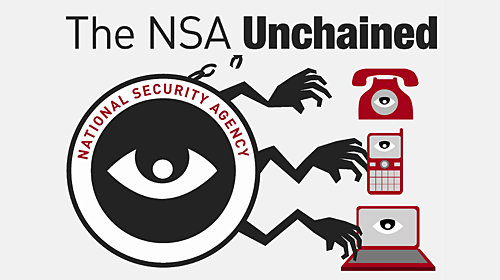Today at the Supreme Court: The Right to Challenge Warrantless Wiretapping


The ACLU to argue for the right of Americans to challenge a law that instituted a far-reaching and unconstitutional surveillance regime. The FISA Amendments Act of 2008 dramatically expanded the government's authority to monitor Americans' international phone calls and emails, to store these communications indefinitely in huge databases, and to share them with other agencies with few restrictions.
The question before the justices today was—from one perspective—a narrow one: whether our clients have legal "standing" to challenge the law. But it is also about the ability of the executive and legislative branches to insulate a policy from meaningful judicial review.
The plaintiffs in the lawsuit, Clapper v. Amnesty, include attorneys and human rights, labor, legal, and media organizations, and their work requires sensitive and at times privileged international communications. The FISA Amendments Act permits the government to conduct dragnet secret surveillance of Americans’ international communications—that is, surveillance that is not limited to a specific person and may go on for up to one year without any court approval. In this way, the FISA Amendments Act of 2008 has created a new surveillance regime that is starkly different from the particularized surveillance of the past.
The consequences are dire for our clients, as the ACLU’s Jameel Jaffer argued forcefully today (). Our clients engage in First Amendment-protected communications that are integral to their professional activities. For example, David Nevin has served as defense lawyer for accused terrorists. In connection with this legal representation, Nevin needs to be able to rely on secure telephone and email communications with experts, witnesses, family members, and his clients abroad. Jaffer explained to the court that such confidential communications are an essential component of any diligent lawyer's work, required by a lawyer's ethical obligation to preserve client confidentiality. By jeopardizing their abilities to engage in confidential communications, the FISA Amendments Act injures our clients, as at least some of the justices seemed to recognize.
The government argued repeatedly that our clients could not know for certain whether their international communications will ever be swept up by the government under the FISA Amendments Act and that, therefore, they could not sue. Several of the justices appeared rightfully troubled by this Kafkaesque position, expressing concern that, under the government’s interpretation, no one would be able to challenge the law—ever. Justice Breyer also noted that risk and certainty are just matters of degree: "It might not be a storm tomorrow. I mean, you know, nothing is certain."
At its core, this is a case about fundamental privacy rights guaranteed by the Constitution. It is also about the proper balance of power within our constitutional democracy—specifically, the crucial duty our judiciary can, and must, fulfill in safeguarding and enforcing those rights.
As Jaffer co-wrote in a with Alex Abdo,
The government's argument is really about the role of the judiciary in patrolling the boundaries between the lawful measures that the executive should take in the defense of national security, and the unconstitutional and effectively unbridled discretion the government now has to acquire Americans' international communications.
Whatever one's views of the legality of the FISA Amendments Act, the government's efforts to shield the law from any meaningful judicial review should be profoundly disturbing to all Americans.
Learn more about warrantless wiretapping: Sign up for breaking news alerts, , and .

